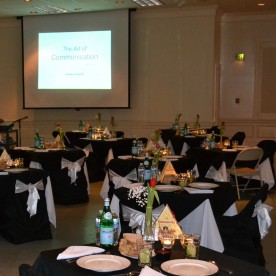 Last Sunday night’s marriage course at Galilee Church featured a candlelit dinner and our pals, Anne Ferrell and Bob Tata, in the teachers’ seat. They hit a home run. After starting with a story about a British fella who drove 70 miles after accidentally leaving his wife of 40 years at a filling station (“I usually sit in the back because I can move around more,” the lady said, “but normally we talk”), the Tatas dove into the first-class material offered in the Alpha Marriage Course and gave us some great tips on communication.
Last Sunday night’s marriage course at Galilee Church featured a candlelit dinner and our pals, Anne Ferrell and Bob Tata, in the teachers’ seat. They hit a home run. After starting with a story about a British fella who drove 70 miles after accidentally leaving his wife of 40 years at a filling station (“I usually sit in the back because I can move around more,” the lady said, “but normally we talk”), the Tatas dove into the first-class material offered in the Alpha Marriage Course and gave us some great tips on communication.
There was plenty of good counsel on things like acknowledging each other’s feelings, “reflecting back” (trying to accurately summarize what the other person has said, and how they feel), and identifying what is most important in any given conversation. That stuff was valuable. But I found myself drawn to the “bad habits” section of the presentation, habits that can prevent someone from talking about their feelings and experiences. Left unchecked, these little nasties can make a person just shut down, destroying not just the communication, but the relationship.
Wanna know what they are?
(Be careful now. I thought I did, too. I thought I could, you know, identify “my” habit, get on some sort of 12-step plan, and lick it. Um, no. Did I mention that there are five habits?)
(Turns out I would need, like, 60 steps.)
Anyhow, here they are:
1. Reassuring. The reassurer jumps in before the speaker can finish a sentence, saying things like, “It will all work out,” and even sometimes offering a comparison point, like the woman the Tatas know who called a friend to share the good news of her engagement and, upon learning that the other gal was headed for divorce, said, “It’s okay. It’s not so bad. I am probably going to get divorced, too.” Reassurers act like there is no real problem, which can prevent speakers from expressing any real feelings.
2. Giving advice. The advice-giver is a “fixer.” Instead of offering empathy, the advice-giver just wants to sort things out. Men, especially, are guilty of this habit…sometimes, if the wife has just broken her favorite vase or pitcher, she doesn’t want a broom. She wants a hug.
(But we girls can be advice givers, too. I mean, I write a blog.)
3. Intellectualizing. The intellectualizer might also be called the explainer, or the rationalizer. When he or she hears that you’ve had a bad day, instead of listening, the intellectualizer jumps in with something like: “There’s no doubt that it’s due to a combination of factors. It’s very humid outside, you are under pressure at work, and given how much we just spent to fix the washing machine, you are probably worried about our finances.” Um, who wants to keep talking into that information fire hose? Talk about a buzz killer.
4. Going off on a tangent. This habit probably needs no explanation. If you’ve confided your feelings to a friend, only to have him or her say, “Really? You know, that reminds me of the time I…,” you’ve met a deflector. People who go off on tangents aren’t really interested in what you are saying; they want to direct the conversation down a new (and more attractive, to them) course. Deflectors can be well-intentioned (like when they want to take your mind off of a sadness), but if the end result is that they squelch your freedom to feel or to speak, it’s a bad habit.
5. Same goes for the interrupters. Stephen Covey says that most people don’t listen “with the intent to understand; they listen with the intent to reply.” Interrupters figure out where a person is going with a conversation and then they jump in, either finishing the speaker’s sentence or responding with something that they think is more witty or interesting. I read where the average person can only go 17 seconds without interrupting someone. Really? That sounds long, to me.
(I am going to try to let Robbie talk for at least 30 seconds, just to see.)
(He will probably ask if I am feeling okay.)
So there you have it. The five “bad habits.” Just knowing what they are is supposed to help you listen better–a skill that, they say in The Marriage Book, involves things like giving the other person your full attention, coping with distractions, showing interest, and acknowledging feelings. And not, presumably, mocking them.
See? I am doomed.
But at least I am in good company. There are 30 couples taking the Marriage Class, many of whom have been hitched for less than five years. One of the perks of the class is the free childcare and, at the end of the evening, one of the dads thanked me and started to head out to the parking lot. His wife looked at me, then looked at him.
He was like, “What?”
(I knew where this convo was headed but, for once, I wasn’t about to interrupt.)
She waits a beat, gives me a look that will make me love her forever, and then says, “Ah…Honey? The baby? The one we have to get from the nursery?”
Oh yeah. Forty years from now, that sweet gal might find herself at a filling station. I better remind her to start sitting in the front seat when he is driving, just in case.
















